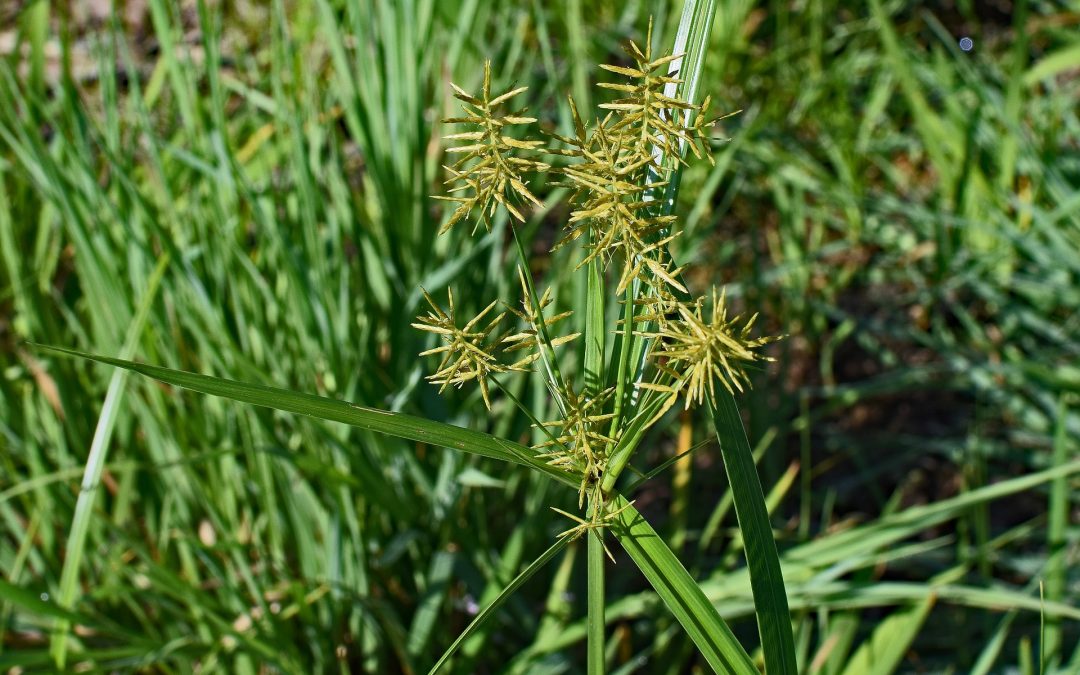With four mild but distinct seasons, Richmond offers a perfect environment for us to enjoy the great outdoors. It also gives weeds plenty of opportunities to invade, often undetected. Here’s a guide to some of the worst weeds in Richmond and how to control them.
Nutsedge
Far more insidious than the annual weeds covered above, nutsedge (pictured above) has the unfortunate distinction of being an annual weed, which means that its invasions are not limited to spring or fall. This very aggressive weed requires a long-term strategy to eliminate, so be prepared for a marathon rather than a sprint. Nutsedge thrives in moist areas and can be an indicator that you’re overwatering. Small patches of nutsedge can be eliminated by digging out (to a depth of 10 inches), but larger concentrations will have to be treated with a specific post-emergent herbicide during warm months.
Dandelion
Despite our childhood wonder and making wishes blowing on the white poofs of dandelion seeds, this is one noxious weed. What’s more, those “wishes” send airborne seeds far and wide — for miles — much to the dismay of anyone with a lawn. The key to controlling these perennial weeds is to catch them in the spring before they’ve had time to spread. As soon as you spot one in the lawn, take care to pull up the entire plant including the taproot. If you’ve got a dandelion problem, then a broadleaf herbicide applied in the fall can help.
Chickweed
A cool-season annual, chickweed is adaptable to almost any condition, although it prefers moist, well-irrigated soil. If it’s allowed to spread, you’ll notice it first by the small white flowers it sends out. You can control it by manually pulling up the plants by their shallow roots as they appear. However, the bare areas they leave in the lawn are an invitation to other weeds. Aeration and reseeding in the early fall can help to fill in any gaps in the turf. Use herbicides as a last resort, only if frequent mowing doesn’t prevent the chickweed from going to seed.
Purple Deadnettle
Another winter annual, purple deadnettle is part of the mint family that makes its appearance in late March and early April. Mild winter seasons can help these worst weeds in Richmond can get a head start, taking advantage of any gaps in the lawn. Bare spots in your lawn can also be exploited by aggressive summer weeds like crabgrass. Hand weeding is effective for small outbreaks, but applying a pre-emergent herbicide in the fall is the only way to prevent an infestation. Don’t bother treating with herbicide in the spring. Your best course of action is actually to mow regularly to prevent the mature plants from going to seed.
Remember that most weeds are opportunists who exploit any gap in the lawn and take advantage of issues in that make it easy for them to outcompete turfgrass. The best way to defend your lawn against them is to keep it lush, dense, and healthy. Aeration, good mowing technique, appropriate irrigation, and well-timed fertilization will all contribute to your lawn’s health. A bit of effort spent on maintaining a healthy lawn will save you loads of time spent combatting the weeds.
Looking to learn more about lawn care and gardening in Richmond? Visit our Richmond, Va., lawn care page.

